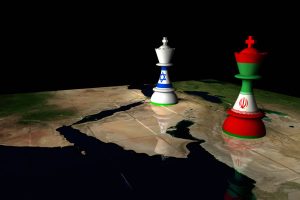A Parable for Germany

Dying Germany has only one item on its bucket list, and that is redemption. The Germans cannot seek redemption from the crimes of their grandparents because they do not understand what motivated them to do such terrible things.
- For Merkel and most of Germany’s elite, the appearance on Germany’s threshold of millions of Muslim refugees is a final chance at redemption, an opportunity for Germany to redeem itself from the crimes of its past through a transcendent act of selflessness.
-
Denke ich an Deutschland in der Nacht
Dann bin ich um den Schlaf gebrachtIf I think of Germany in the night
It kills my sleep.– Heinrich Heine.
Once there was an old man who in his youth committed a terrible crime, the murder of many innocents. He no longer could remember what drove him to do this; he tried not to think about it, and his memories came to mind unwillingly and infrequently. Rage and guilt had faded long ago into a vague residue of disgust. He worked hard and found some distraction in the monotony of daily tasks. He sought diversion in tasteless entertainment; he followed football, looked at pornography, watched the dubbed version of American comedies, and took vacations at the beach.
He had a child but no grandchildren; his child knew that he once did unforgivable things, but did not want to know what they were, and the old man did not want to tell him. The old crime hung like a black curtain between them.
The old man could feel that he did not have long to live. Ahead of him he saw only days clouded with boredom, illuminated only by the occasional flash of regret. He let the days come and go one at a time until their count might come to an end, for he did not know any other way to live. Because he had no ties to life, he had no way to prepare for death.
One day the old man met a street urchin and on an impulse invited him back to his apartment. He fed the strange boy and gave him a place to sleep. The next morning the old man bought the urchin new clothes, and gave him things — a smartphone, a video-game system, a football jersey. The street kid made himself at home and said little.
Before long, the old man noticed that things had gone missing. A watch that belonged to his father disappeared from a drawer. A silver souvenir goblet no longer stood in the cupboard. Even worse, he came home to find things broken with apparent intent. The remains of a glass pitcher lay in shards on the kitchen floor. The bathroom mirror was cracked. A sofa cushion was slashed.
At length, the old man confronted the boy: “I have only done you good. Why do you do this to me?” The boy laughed at the old man, then punched him. The old man lay on the floor, bleeding from his nose and lips. Perhaps he should call the police? He thought: “No, I will not call the police. What does it matter? I will die soon anyway. Perhaps some good will come of it.” The prospect of death robs us of rationality, especially if we perceive that our life has gone wrong.
* * *
German Chancellor Angela Merkel, Time Magazine’s Person of the Year for 2015, was the model of rationality, finding resources to backstop Germany’s near-bankrupt southern neighbors during the great European debt crisis of 2012, defusing the Ukraine crisis after the Maidan coup and the Russian takeover of Crimea, balancing Atlantic commitments and European integration, while presiding over Europe’s only successful major economy. Merkel was rational, that is, until she wasn’t.
Admitting 1.2 million Muslim refugees in 2015 and perhaps another million in 2016, and sticking to her guns after the organized mass sexual abuse perpetrated by migrants in Cologne and other German cities on New Year’s Eve, was an act of existential despair, not a rational act. What explains this seemingly sudden transformation?
Chancellor Merkel, it seems clear, acted on an impulse that was as sudden as it was irresistible. As the global refugee count passed the 60 million mark last year, Germany did nothing. Between January 1, 2014 and June 30, 2014, fewer than 1000 newspaper stories appeared in the German-language media with the word Flüchtlinge (refugees) — mostly about boat disasters in the Mediterranean.
A January 2, 2014 story in the Berliner Morgenpost noted that the German government planned for 6,000 refugees in the course of the year. During the second half of the year, more than a quarter of a million stories appeared. Only when the refugee crisis threatened to create a humanitarian disaster on Germany’s borders did the Merkel government act.
This kind of impulsiveness begs explanation. Since the Second World War, Germans have preferred not to think about their past, because it is too horrible to contemplate. The German school system dutifully teaches about the Holocaust and German cities dutifully memorialize the murdered Jews; the walls of Frankfurt’s old Jewish cemetery are covered with small bronze plaques for every Jew deported from the city. “They will never forgive us for Auschwitz,” quipped the Austrian-Israeli psychiatrist Zvi Rix, and Germans often attempt to relativize the crimes of National Socialism by attributing similar things to the Jews. 54% of Germans under the age of 29 have a negative opinion of Israel, according to a January 2015 poll by the Bertelsmann Institute.

Germans work hard and immerse themselves in private life: in hobbies, vacations, and sports. But they do not have children, to a great extent because they do not like themselves. Germany is dying. It can not only foresee, but calculate with a reasonable degree of accuracy, the point at which so few Germans will inhabit the lands between the Rhine and the Oder that it will be as meaningless to speak of Germans as it is to speak of Etruscans or the people of Thrace. At 1.3 children per woman, Germany’s population of young people (0 to 19 years) and working-age adults (20 to 64 years) will halve by the end of the present century.

Dying Germany has only one item on its bucket list, and that is redemption. The Germans cannot seek redemption from the crimes of their grandparents because they do not understand what motivated them to do such terrible things. Their great-grandparents during World War I believed in the superiority of German culture, and their grandparents during World War II believed in the superiority of the Aryan race. Today’s Germans can only believe that no culture and no race has any claim to precedence, and that all the world’s cultures have equal value.
Israel’s unabashed nationalism horrifies them, because National Socialism’s claim to the status of “master race” was a Satanic parody of the Election of Israel. Jewish strength and success, in German eyes, are an uncomfortable reminder of the Nazis’ perversion of the biblical idea of Chosenness.
For Merkel and most of Germany’s elite, the appearance on Germany’s threshold of millions of Muslim refugees is a final chance at redemption, an opportunity for Germany to redeem itself from the crimes of its past through a transcendent act of selflessness. The Germans turned away from self-sacrifice for the Fatherland to the extreme of self-absorption. Germany became materialistic, irreligious, and Philistine. But self-absorption was a poor distraction from the sense of horror that lingered after the Second World War. The Nazis used terror and horror — Schrecken und Entzsetzen (lit. “dislodgement”) to bind the German people to their leadership. The prospect of new horrors arising not from a clash of civilization, but from internal clashes within Muslim civilization, is too much for the Germans to bear, because it recalls the horrors of the past war.
That is why Germans tumbled headlong into their decision to admit millions of Muslim refugees only when the horrors of war presented themselves on Germany’s own doorstep. Until the flood of refugees reached Central Europe last summer, Germany showed little interest in their problems. As noted, Germany had prepared to admit only 6,000 refugees in 2015. Not until September, after a news photo of a drowned Kurdish boy went viral, and a dozen decomposing bodies were found in an abandoned truck in Austria, did Merkel declare, “Wir schaffen es.” [“We can do it.”] It is also why Germany will not reverse this policy no matter what sort of crimes the refugees commit.
Mrs. Merkel’s rationality crumbles before the horrific prospect of human suffering. Germany’s elites hope that one last, great national valedictory act will open the prospect of redemption.
Ordinary Germans, to be sure, do not like to be assaulted sexually by organized mobs, or subjected to other social pathologies that the refugees bring with them. Despite some objections, including some very vocal ones, Germans nonetheless will do what the Obrigkeit [Authority] tells them, just as they always have done.
Sadly, Germany is looking for redemption in all the wrong places. Its obsession with helping the refugees is not a mistake or a misjudgment, but an existential impulse so powerful that all the evidence in the world of the baleful effects of this policy will not outweigh it. There is no dissuading the Germans from hastening their own destruction. They can only stand as a terrifying example for the rest of us.
David Goldman is an American economist, author and a principle of Asia Times HK,LTD

























